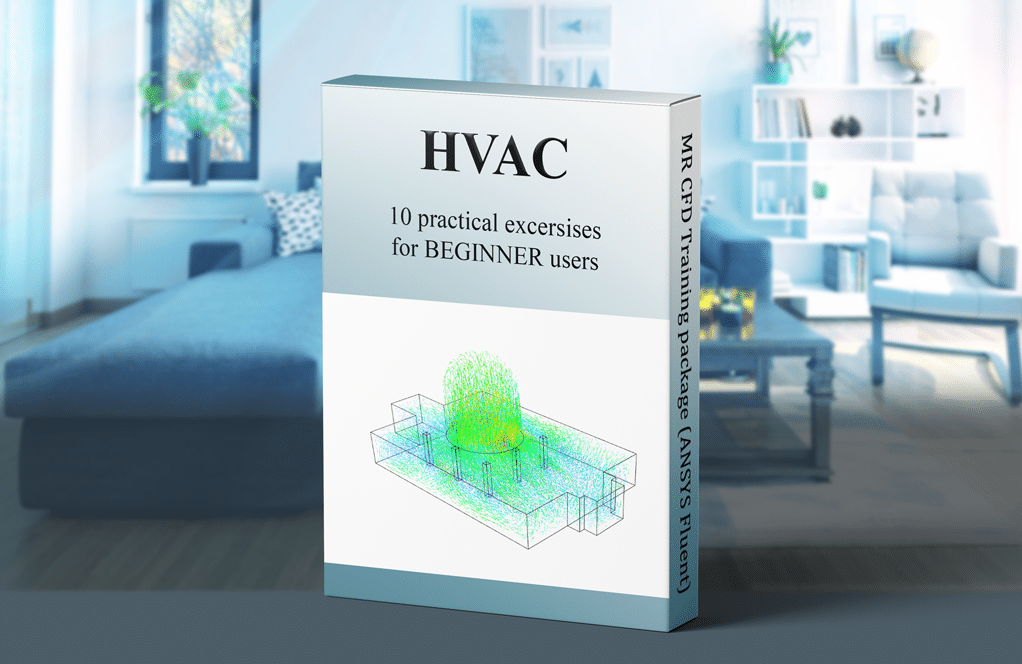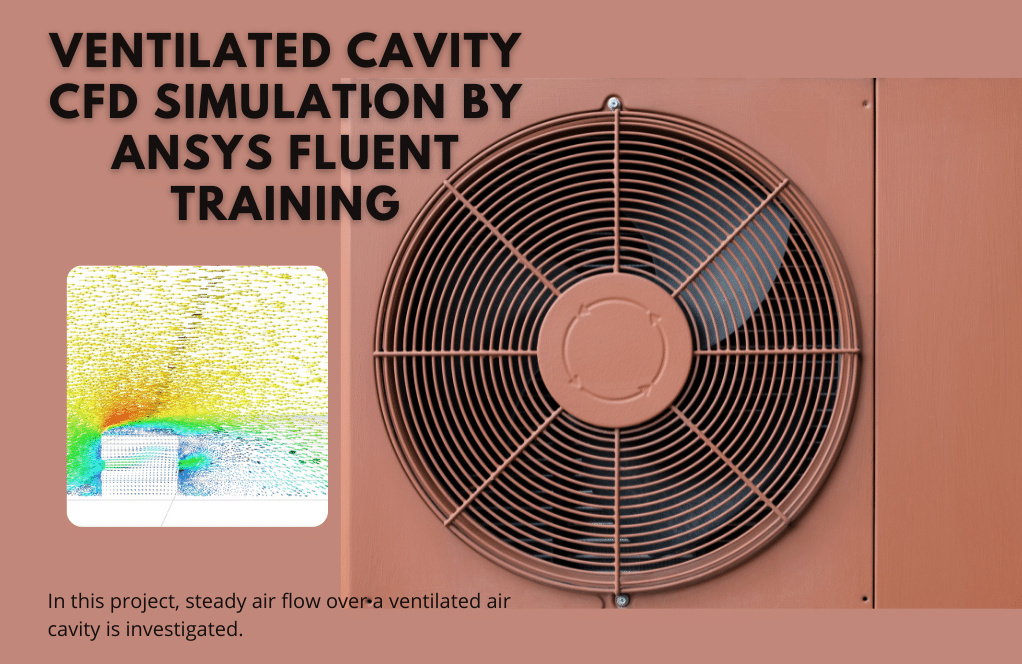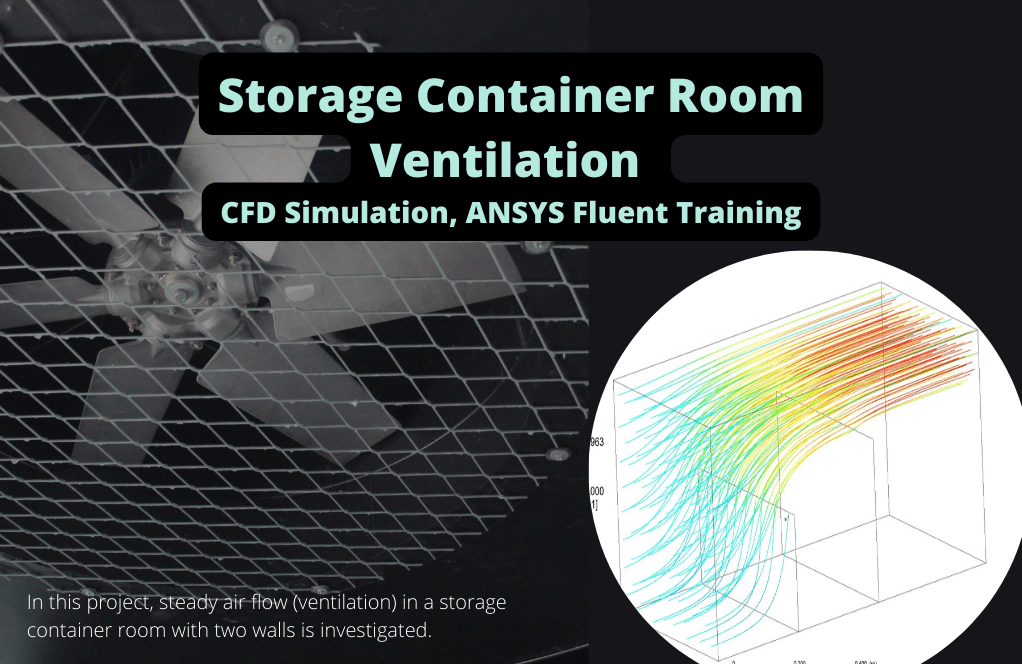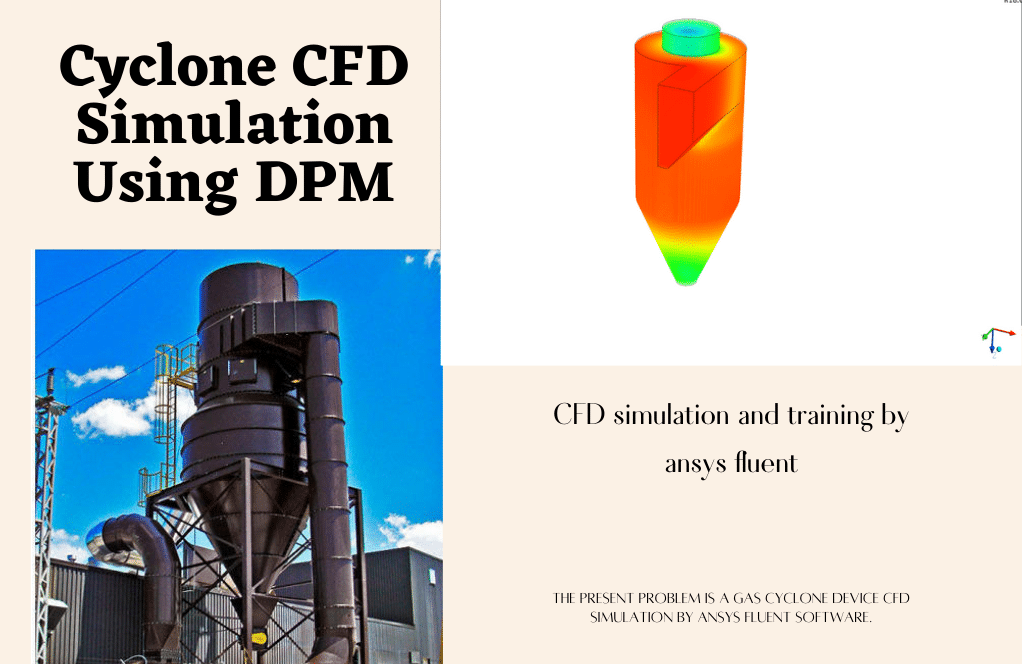HVAC Training Package for Beginners, 10 Practical Exercises
$129.00 $64.50 Student Discount
This package includes ten practical exercises in the HVAC field by ANSYS Fluent software for BEGINNER users.
Click on Add To Cart and obtain the Geometry file, Mesh file, and a Comprehensive ANSYS Fluent Training Video.To Order Your Project or benefit from a CFD consultation, contact our experts via email (info@mr-cfd.com), online support tab, or WhatsApp at +44 7443 197273.
There are some Free Products to check our service quality.
If you want the training video in another language instead of English, ask it via info@mr-cfd.com after you buy the product.
Description
HVAC ANSYS Fluent Training Package, 10 Practical Exercises for BEGINNER Users
Heating, ventilation, and air conditioning are the technology of internal and vehicular environmental relief. It aims to prepare thermal comfort and tolerable Indoor Air Quality (IAQ). HVAC system modeling is a mechanical engineering subfield based on thermodynamics, fluid mechanics, and heat transfer.
In the HVAC System design, you may meet considerable technological problems that affect your CFD simulations. Whether you model perfect HVAC systems or the generation of HVAC ingredients, computational fluid dynamics (CFD) software from ANSYS Fluent can support you in outreach your technical challenges.
This CFD Training Package helps you to overcome the following issue:
- Indoor Air Quality (IAQ)
- Energy Efficiency
- Minimize System Cost
- Reduce Design Time and Expense
- Understand and Diagnose Problems
- Improve Performance
This package includes 10 different practical exercises in the HVAC field by ANSYS Fluent software for BEGINNER users.
Practical exercise number 1 simulates the airflow around the outer body of swamp coolers as cross ventilation. The function of water cooler systems is such that the outside warm air is sucked into their building and meets the pumped water flows in the cooler. The water flow receives the latent heat it needs to evaporate from the perceptible heat of the incoming airflow, and as a result, it evaporates. In project number 2, the movement of the cooling airflow inside a room applying a swamp cooler is investigated. The air inside the room is cooled using a swamp cooler and is distributed inside the room space. The standard k-epsilon model is exploited to solve turbulent flow equations, and the Energy equation is activated to calculate the temperature distribution inside the computational domain. Problem number 3 simulates the heat transfer from a floor heating system into a room. In fact, this heating system is built into the floor of the room, which acts as a heat source. It is assumed that this heating system has a constant thermal flux of 166.6 W.m-2.
In practical exercise number 4, the heat transfer of an underfloor heating system in an enclosed space was simulated and analyzed by ANSYS Fluent. It is assumed that the underfloor heating system generated heat flux is assigned to the bottom wall (other walls are considered to be adiabatic). Since in this analysis, an underfloor heating system is used to generate heat, no fluid flow inlet is used in this project, and only a pressure outlet is defined. Problem number 5 simulates the airflow inside a room and the process of air conditioning. There are three sections for the entry of fresh air on the roof of the room; So that the airflow enters the interior of the room with a speed equal to 0.4 m.s-1 and at a temperature equal to 295 K. In project number 6, steady airflow in a storage container room with two walls is investigated. Container rooms are often used for the storage of industrial goods which are perishable and are required to be kept under influence of steady airflow for purpose of cooling and ventilation. In the present work, steady airflow is simulated in a 0.5 * 0.5 * 1 room with two walls against the airflow path, which represents containing chamber.
In practical exercise number 7, steady airflow over a ventilated air cavity is investigated. The simulated cavity has a hole that extends in flow direction all over the cavity length and makes the simulation more challenging. Fluid flow over objects is of great importance since the results are useful in several branches of fluid mechanics, such as aerodynamics. To increase efficiency and reduce the risks of temperature rise in server rooms, the safe range offered by manufacturers is in the range of 10 to 32 degrees. Thus, decreasing the temperature below 10 degrees and increasing the temperature above 32 degrees creates unstable conditions in terms of thermal comfort in these rooms. Therefore, the airflow inside the server room was modeled using Ansys Fluent in practical exercise number 8. Problem number 9 simulates the process of heat transfer through the underfloor heating system by the spiral pipe. In this project, a room is designed for cold winter conditions, and a floor heating system is installed to heat the air inside the room. The underfloor heating system is in the form of a spiral tube that carries the flow of hot water.
Finally, practical exercise number 10 is to simulate the airflow and ventilation inside a windcatcher as the last product of this package for Intermediate users. The windcatcher is octagonal and has a relatively simple structure. The windcatcher consists of a column for pulling the out air to the inside or sucking up the air inside, room space for air circulation inside it, and a wall for the space around the building of this windcatcher, and also this windcatcher set is located in a large space of open airflow domain.
3 reviews for HVAC Training Package for Beginners, 10 Practical Exercises
Related products
-
Cyclone by DPM ANSYS Fluent CFD Simulation Training
Rated 5.00 out of 5$120.00$60.00 Student Discount














Bruce Gutmann –
Can this training package help me understand the impact of different HVAC configurations on the indoor air quality?
MR CFD Support –
Absolutely! This training package includes simulations that show the impact of different HVAC configurations on the airflow and temperature distribution in a building, which are key factors affecting indoor air quality.
Russell Kling –
Can I use this training package to design HVAC systems for specific building types, like hospitals or schools?
MR CFD Support –
Yes, you can use the principles and methods taught in this training package to design HVAC systems for any type of building. The simulations can be adjusted to match the specific geometry and conditions of your building.
Mr. Darrell Collins –
I have some ideas for improving this training package. Can I contribute?
MR CFD Support –
We welcome and appreciate contributions. Your ideas could help us improve our training packages and provide better solutions to our users. Thank you for your interest and support!
ramaj saleh –
I am an architecture engineer, and I started to energy evaluate my design with CFD simulation, this package.
i talked with Mr cfd support and they suggested this package to me, it is so user-friendly and so comprehensive, although I have studied the comprehensive training package before this one
thanks MR CFD.
Prof. Darwin Prosacco V –
I just completed the HVAC Training Package for Beginners, and I must say I’m thoroughly impressed. The variety of exercises provided a solid understanding of different HVAC scenarios and the use of ANSYS Fluent software. The step-by-step approach was perfect for a beginner like myself, and doing the practical exercises was incredibly useful for learning the specifics of HVAC system simulations. I particularly appreciated the inclusion of both heating and cooling systems, as well as the unique designs like the windcatcher. This learning experience has boosted my confidence in using CFD software for HVAC simulation. Thank you, MR CFD Company, for this wonderfully comprehensive learning tool.
MR CFD Support –
We’re delighted to hear that you found our HVAC Training Package beneficial for your learning journey! Your feedback is greatly appreciated, and it’s fantastic to know that the content was clear and diverse enough to give you a comprehensive understanding of HVAC in different settings. We’re here to provide quality education and support, so feel free to reach out to us if you have any further questions. Thank you for choosing MR CFD for your skill development in CFD simulations. Keep up the great work!
Johannes –
This package is awesome!! especially the one product about Covid-19 patient breathing in a clean room. eagerly waiting for the second part.
Mr CFD Support –
Thank you. We will do our best to finish the second part of HVAC training in the minimum amount of time.
Emma –
Reze is super helpful and the package is awesome!
Amiya Ondricka –
I’m intrigued by the comprehensive approach of this training package. I recently completed all exercises, and the step-by-step instructions gave me a grounding in HVAC design principles and the practical application of ANSYS Fluent. The mix of theory and actual CFD problems complements the theoretical knowledge immensely. Thumbs up to MR CFD for creating such an insightful beginner’s package!
MR CFD Support –
Thank you very much for your positive feedback! We are delighted to know that our HVAC Training Package has helped you gain a better understanding of HVAC systems and their simulation using ANSYS Fluent. We aim to provide helpful resources for all levels of learners, and it’s great to hear the package has been beneficial for you. If you have any more questions or need further assistance at any point, please don’t hesitate to reach out!
Taya Schamberger –
This HVAC training package was a comprehensive starting point for my entry into HVAC design and simulation. Practical exercise Number 7 on airflow over a ventilated air cavity was particularly helpful for my project on building ventilation. Each tutorial was clear, promoting an understanding of the basics of airflow and thermal regulation in various situations. The progressive structure, from beginner to more advanced scenarios, built up my skills methodically.
MR CFD Support –
Thank you for your insightful feedback! We’re glad to hear that Practical Exercise Number 7 was particularly beneficial for your project on building ventilation. It is satisfying to learn that our structured approach helped enhance your understanding of HVAC systems incrementally. If you have any more questions or need further assistance on any HVAC-related problems, please feel free to reach out.
Pierre Smitham V –
This package of exercises seems quite comprehensive for beginners. Was it easy to follow, and can you provide a specific example of the knowledge you felt was particularly well explained?
MR CFD Support –
Absolutely! The exercises were quite user-friendly and intuitive. I found the section detailing the modeling of underfloor heating systems using ANSYS Fluent particularly instructive. It clearly elaborated how to set up the thermal flux boundary conditions and demonstrated the effects of the underfloor heating on room temperature distribution. I now feel confident in my ability to simulate and analyze similar HVAC systems.
Jordy Effertz –
Wonderful training package for beginners in HVAC using ANSYS Fluent. It’s broad and detail-rich, giving a firm foundational understanding of various HVAC problems and their CFD simulations. Great for anyone looking to strengthen their practical knowledge in this domain.
MR CFD Support –
Thank you for your positive feedback! We’re thrilled to know our HVAC Training Package has provided you with a strong foundation and practical knowledge in the field. If you have any further questions or need assistance as you continue to learn and apply your skills, feel free to reach out to us.
Louvenia Wiza –
History of results from different projects should be great to learn from them apart from theoretical knowledge.
MR CFD Support –
Thank you for your feedback! I’m thrilled to hear that our HVAC Training Package for Beginners has provided you with valuable hands-on experience. It’s wonderful to hear that the practical exercises complement the theoretical knowledge. Keep practicing and don’t hesitate to reach out if you have any questions or need further assistance.
Delta Hickle –
It seems like a comprehensive training package for anyone starting out with HVAC simulation – a brief intro to a variety of key problems and air flow scenarios. As someone interested in energy efficiency, I am curious if the course offers insights on optimal designing of HVAC systems to support energy-saving measures.
MR CFD Support –
We’re glad you’ve recognized the comprehensiveness of the HVAC Training Package. Regarding energy efficiency, the package does cover essential principles that form the basis for optimally designing HVAC systems. Throughout the practical exercises, users learn about the influence of system design on airflow, temperature distribution, and energy consumption, which are the key ingredients for creating energy-efficient designs.
Christophe Koch –
I appreciate the thorough and practical approach the HVAC Training Package has delivered! The variety of exercises seems to cover a broad range of scenarios. It provided me with insight into CFD simulation for environmental comfort in buildings, enhancing my foundational knowledge effectively.
MR CFD Support –
Thank you for your kind words! We are glad to hear that our HVAC Training Package has helped you gain a better understanding of CFD simulations for environmental comfort. Your satisfaction with the learning experience is our top priority, and we appreciate your feedback.
Jayme McCullough –
I’m thrilled with how the HVAC Training Package has been a valuable resource for me as a beginner! The step-by-step guidance through different types of simulations such as cooler systems, room air conditioning, heat transfer from floor systems, and even airflow in storage containers has made learning ANSYS Fluent much easier. I particularly appreciate the detailed setup for each practical exercise which ensures that vital topics like energy efficiency and indoor air quality are well addressed. Understanding these concepts is crucial in HVAC design, and this package has made it all the more accessible.
MR CFD Support –
We’re glad to hear that our HVAC Training Package has greatly assisted you in understanding and simulating various HVAC systems using ANSYS Fluent. It’s fantastic that our practical exercises have been informative and valuable in enriching your knowledge, especially as a beginner. Thank you for your positive feedback, and we wish you further success in your learning journey.
Alessandra Wiza –
The HVAC training package was insightful and easy to understand as a beginner. The exercises stepped through various realistic scenarios that helped me understand the principles of airflow and temperature regulation within different environments. The challenge of simulating airflow in complex structures like server rooms and windcatchers provided a deeper insight into practical applications of CFD in HVAC systems. This improved my grasp of thermal comfort, energy efficiency and IAQ significantly.
MR CFD Support –
Thank you for your positive feedback! We’re delighted to hear that the HVAC training package met your educational needs and helped enhance your understanding of thermal comfort principles, air quality and energy-efficient designs in CFD simulations. If you ever have any further questions or need assistance with your HVAC projects, don’t hesitate to reach out. Your success is our priority. Keep up the great work!
Herta Marvin –
What a fantastic learning experience! I recently completed the HVAC Training Package for Beginners, which included the 10 Practical Exercises, and I have found it exceptionally beneficial. The real-world applications and hands-on simulations vastly improved my understanding of HVAC system dynamics. The in-depth analysis and step-by-step guidance through different types of HVAC scenarios using ANSYS Fluent gave me the confidence to tackle HVAC-related challenges. A top-quality resource for anyone serious about mastering the basics of HVAC in CFD simulations.
MR CFD Support –
Thank you so much for your kind words! We are delighted to hуфгыmуфddsать your positive experience with our HVAC Training Package. We strive to provide comprehensive education for our users, and hearing your feedback means a lot to us. We are proud to have been part of your journey in mastering HVAC in CFD. If you need further assistance or decide to take on more advanced challenges, feel free to reach out to us. Keep up the fantastic work!
Prof. Toy Nicolas –
I recently finished the HVAC Training Package for Beginners. The step-by-step exercises made complex concepts much easier to understand and apply. I can see my skills have improved significantly. Well done on creating such a user-friendly learning tool for newcomers to the CFD world!
MR CFD Support –
We’re thrilled to hear that our HVAC Training Package for Beginners has contributed to your understanding and skill improvement in CFD! Thank you for taking the time to share your positive experience. It is always rewarding to know that our training tools are effective and appreciated. Keep up the great work, and don’t hesitate to reach out if you need further assistance or have any questions in your continuing journey with CFD and ANSYS Fluent.